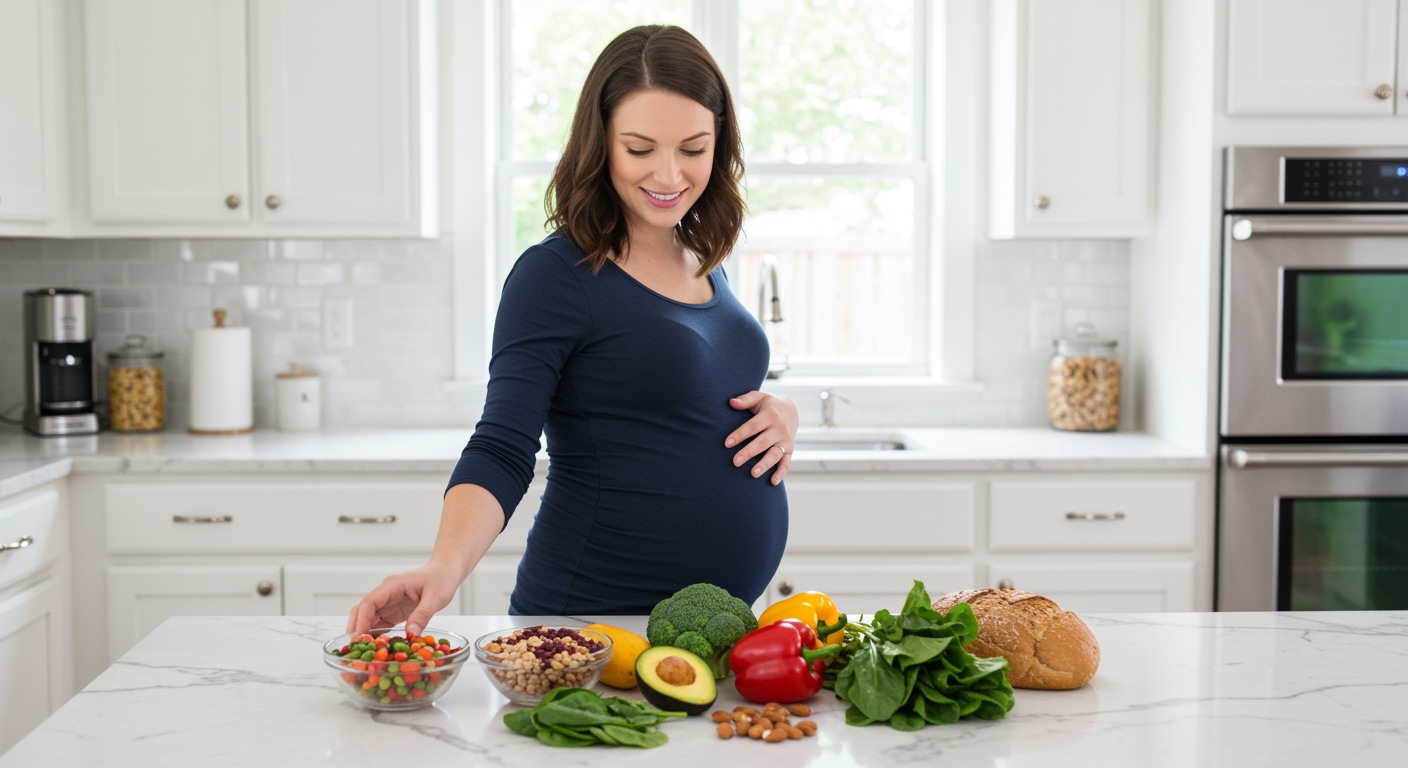✪ Key Highlight: Pregnant women eating less than 18 grams of fiber daily risk their babies developing communication and motor skill delays by age three.
Introduction
A shocking new study reveals that most pregnant women unknowingly harm their babies by eating too little fiber.
Research published in Frontiers in Nutrition shows that fiber deficiency during pregnancy directly impacts baby brain development and future learning abilities.
Hi, I’m Abdur, your nutrition coach and today I’m going to analyze this groundbreaking research about how fiber intake during pregnancy affects both maternal health and baby development.
Why Does Fiber Matter During Pregnancy?
Fiber transforms your gut bacteria into powerful allies for both you and your developing baby.
When you eat fiber-rich foods, beneficial bacteria in your digestive system produce short-chain fatty acids.
These special compounds cross the placental barrier and directly support your baby’s brain development.
The research shows that mothers with higher fiber intake had babies with better communication skills, fine motor abilities, and problem-solving capabilities by age three.
Your gut microbiome also influences your immune system strength during pregnancy.
A diverse, fiber-fed bacterial community helps control inflammation and supports healthy weight management throughout pregnancy.
✪ Fact: Short-chain fatty acids produced from fiber can cross the placenta and directly nourish your baby’s developing brain tissue.
What Happens When You Don’t Eat Enough Fiber?
The Japanese birth cohort study revealed alarming consequences of low fiber intake during pregnancy.
Mothers consuming the least amount of fiber were significantly more likely to have children with developmental delays.
These babies showed problems with social skills, communication abilities, and fine motor development by their third birthday.
Low fiber intake also affects maternal health by reducing beneficial bacteria that support immune function.
Without adequate fiber, your gut produces fewer protective compounds that help regulate blood sugar and control inflammation.
This creates a cascade effect that can increase your risk of gestational diabetes and excessive weight gain during pregnancy.
✪ Pro Tip: Track your fiber intake for one week to see if you’re meeting the minimum 18-gram daily requirement during pregnancy.
How Much Fiber Do You Actually Need?
The research establishes 18 grams daily as the minimum fiber intake needed to protect your baby’s development.
However, many nutrition experts recommend aiming for 25-30 grams during pregnancy for optimal benefits.
This amount supports maximum production of beneficial short-chain fatty acids that nourish both you and your baby.
One cup of cooked beans provides about 15 grams of fiber, while a medium apple with skin contains 4 grams.
Two slices of whole grain bread add another 6 grams, and one cup of cooked broccoli contributes 5 grams.
The key is spreading fiber intake throughout the day rather than consuming large amounts at once.
This approach prevents digestive discomfort while maintaining steady production of beneficial bacterial compounds.
✪ Note: Increase fiber intake gradually over 2-3 weeks to allow your digestive system to adapt and prevent bloating or gas.
Can Plant-Based Diets Support Healthy Pregnancy?
The Nutrients journal study confirms that well-planned plant-based diets are safe during pregnancy.
Women following plant-based eating patterns showed no increased risk of gestational diabetes, anemia, or high blood pressure.
Plant-based diets naturally provide higher amounts of fiber and vegetable protein that support optimal gut health.
The research found no increased problems with breastfeeding or low birth weight in babies born to mothers eating plant-based diets.
Adding fish oil to a high-fiber, plant-focused diet provides additional benefits for immune system regulation.
This combination supports healthy fat metabolism and helps mothers recover faster after childbirth.
The key is ensuring adequate intake of nutrients like vitamin B12, iron, and omega-3 fatty acids through careful food planning.
✪ Pro Tip: Combine plant-based foods with small amounts of fish or fish oil to maximize benefits for both maternal and baby health.
The Bottom Line
This research proves that fiber intake during pregnancy directly impacts your baby’s future cognitive development and your own recovery after childbirth.
Your daily food choices during pregnancy become your baby’s foundation for lifelong learning and development.
I’d love to hear about your experience with fiber-rich foods during pregnancy or any questions you have about optimizing your nutrition for both you and your baby’s health.
References
At NutritionCrown, we use quality and credible sources to ensure our content is accurate and trustworthy. Below are the sources referenced in writing this article:
- Frontiers in Nutrition: Fiber and Plant Protein During Pregnancy
- PMC Research: Maternal Fiber Intake and Child Development
- University of Michigan: Plant-Based Diet Safety During Pregnancy
- March of Dimes: Vegan Diet During Pregnancy Research





